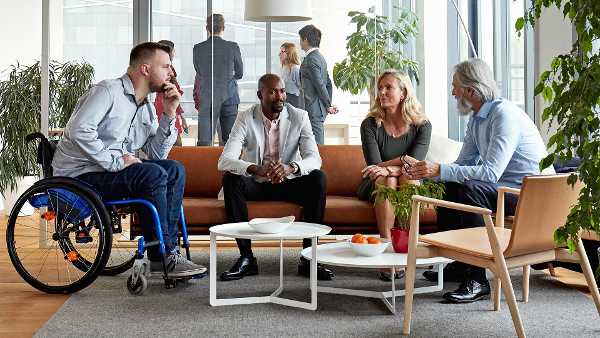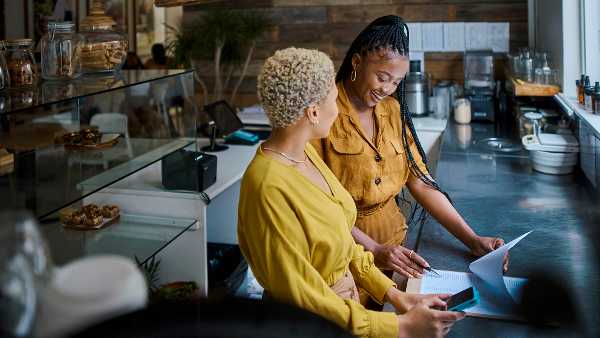Diverse & Inclusive: Everyone is impaired one way or another
- Amber Kuipers
- 17 December 2021
- Edited 8 August 2024
- 4 min
- Managing and growing
- Staff
Striving for diversity and inclusion in the workplace sounds great, but it can be more complicated in practice. Where do you start? And what do you need to do? In the series ‘Diverse & Inclusive’, several entrepreneurs talk about diversity and inclusion in their businesses. In this edition, how deaf and hard of hearing colleagues improve communication for all colleagues.
“If you have an employee with back problems, the intuitive response is to get them a special chair. But if you hire a deaf person or a wheelchair user, people start talking about ‘diversity and inclusion’. To be truly inclusive, you will have to let go of this way of thinking.” These are the words of Karin Ursinus, co-owner of Berengroep, an accessible communications agency. Teaming up with her brother Pascal, she started a marketing communications agency focused on people with a hearing impairment more than 15 years ago. They now also own Tolkcontact, which provides interpreter services on behalf of the Employee Insurance Agenct, UWV. This alllows the deaf and hard of hearing to use a sign language interpreter or a writing interpreter.
“When Irma Sluis became the first sign language interpreter to appear on TV alongside Prime Minister Mark Rutte, it felt like a huge victory”, Ursinus recalls. “It put sign language interpreters firmly on the map in the Netherlands.” Deaf and hard of hearing people can use Tolkcontact to deploy their own sign language interpreter in the workplace, for example during meetings or staff get-togethers. Or privately, when they go to the doctor, a training course, or a family party.
“Everyone is impaired one way or another”
Ursinus stresses that inclusion is in her company's DNA. But what does that look like in practice? Along with one of her employees, Maaike van der Hagen, she explains what true inclusion means according to Berengroep. “It starts with hiring people based on their qualities and skills”, Ursinus explains. “It is all about looking at the underlying person and everything they are capable of.” According to Ursinus, most employers automatically think of all the extra work that goes into hiring a person with a disability. “They never stop to think about what really matters: is the candidate a good fit for your team? Impairments and disabilities are secondary, because there are all sorts of solutions that they will suggest themselves.”
True inclusion is not adapting to one person but adapting to everyone.
“Moreover”, Ursinus adds, “what is an impairment? Everyone is impaired in one way or another. Some people have regular migraines, while people with 4 children may have to leave suddenly if one of them falls ill. Everyone is more than willing to accommodate those impairments, while deaf or hard of hearing employees are labelled ‘disabled employees’. Employees who may need a sign language interpreter or special tools are not that different from employees with families or frequent migraines. They all have their own personal needs.”
The best places to work are the most humane places
For Ursinus, diversity and inclusion are not just CSR buzzwords. They are ways to respond to our ever-changing society. “The labour market of the future is expected to be incredibly tight, and employers will have to find ways to make their company as attractive as possible. And the best places to work are also the most humane places. Create an environment in which everyone feels heard and comfortable.”
This, Ursinus argues, will require a new way of working, abandoning the traditional 9-to-5 mentality as well as strict job descriptions. “Map out all your organisation’s activities and what people you will need to perform them as well as possible”, she explains. “Try to let go of old-fashioned standards like 8-hour workdays as much as possible. Employees with hearing impairments, for example, may tire after a full day of meetings because they have to focus on communicating as well as doing the actual work all day long. Starting an hour later and going home an hour earlier may be an effective solution. Employees who can spend 6 hours working passionately for your company are considerably more valuable than employees who have to slog through an 8-hour stretch. I truly believe that. Give your employees freedom and you will be rewarded. The more diverse and inclusive you are, the better connected you are to society.”
More conscious communication
Maaike van der Hagen, a spokesperson with Berengroep, nods in agreement. “True inclusion is not adapting the workplace to one ‘divergent’ employee. Rather, it is about adapting the workplace to everyone’s needs. Van der Hagen herself was born with a hearing impairment and received a cochlear implant 7 years ago. Although her hearing has improved, she also uses lip reading and sign language.
Inclusion is our shared responsibility.
“At Berengroep, we have our own way of communicating, which has become pretty much second nature to everyone”, Van der Hagen begins. “We use body language, look each other in the eye, do not interrupt each other, and regularly check whether the other person has understood the message. The funny thing is that our hearing colleagues love this approach. We have all become more conscious communicators, and we always try to connect with each other, find a meeting room with pleasant acoustics, and let each other finish. In the end, everyone benefits, not just people who are hard of hearing.”
Magnified barriers
Van der Hagen recalls her delight at having her deafness treated as an advantage when she applied to Berengroep. In the past, interviewers had only focused on the downsides. “We would have just had a great job interview and they would tell me that they would call me soon. This was a time before the Tolkcontact app existed (an app that enables deaf people to communicate by phone), so I was forced to tell them that phone calls were not an option for me. That fact alone usually turned interviews on their head, as people started asking whether I was right for the job. The interviewer’s response alone told me everything I needed to know. I did not stand a chance.”
Van der Hagen was right: she did not get the job. “I was only rejected because I cannot make phone calls. These barriers are often amplified in the labour market. It can be very demotivating if you know how much you have to offer.” Ursinus adds: “It is also unfair, because no other applicant is hired or rejected for just one reason. You should always look at all skills and qualities, not just a single anomaly. At Berengroep, we just have someone else answer the phone. Issue solved.”
We look each other in the eye, do not interrupt each other, and regularly check whether the other person has understood the message. Everyone loves it, including hearing colleagues.
Van der Hagen adds: “Even though deaf colleagues at Tolkcontact do not pick up the phone, they do make phone calls using the Tolkcontact app. People can also communicate with me and other deaf colleagues on video calls or by using the Tolkcontact app. There are so many solutions. Some were made specifically for the deaf and hard of hearing, like the app. Others are already common practice, like video calls. Especially since the COVID-19 pandemic, video calls have become a lot more common.”
Joint responsibility
According to Van der Hagen, this attitude is why Berengroep is now inclusive through and through. “We simply divide tasks like answering the phone or calling customers among ourselves. Take arranging a sign language interpreter for a meeting, for example. At Berengroep, this is a task for all of us, not just my responsibility. My hearing colleagues are fully aware and always ask me whether we have an interpreter for the meeting in question. If we do not, we simply reschedule. It is our joint responsibility to collaborate as optimally as possible. That is what I would call a truly inclusive corporate culture. And it takes a team to create one.”


